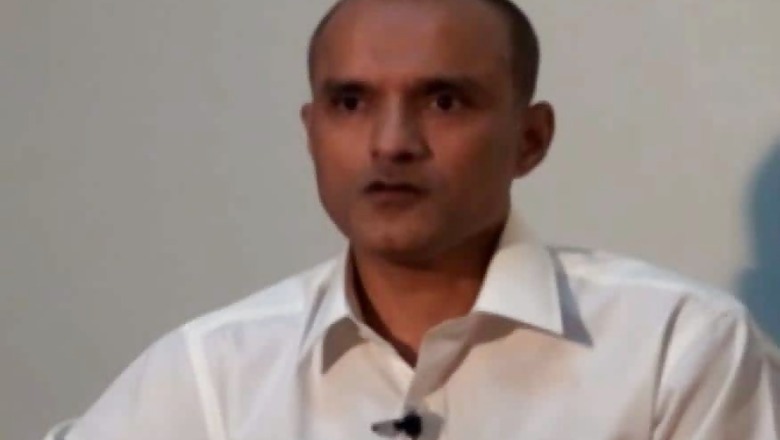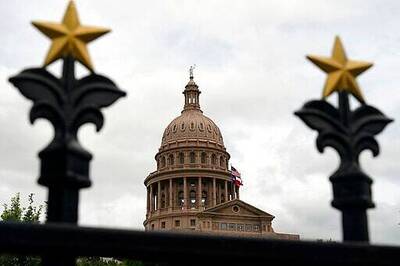
views
New Delhi: The International Court of Justice (ICJ) will on Wednesday deliver its verdict in a case relating to Indian national Kulbhushan Jadhav, whose death sentence by a Pakistani military court based on an "extracted confession" has been questioned by India.
On April 10, 2017, the 49-year-old Jadhav was sentenced to death in a field general court-martial after a three-and-a-half month secret trial by Pakistan. Jadhav is accused of espionage and his alleged links to India’s external intelligence agency, Research and Analysis Wing (R&AW).
Jadhav, who was arrested on March 3, 2016, was sentenced to death on charges that he was dealing with Balochistan freedom fighters. Three years after his arrest, the alleged Indian spy will learn his fate on Wednesday, with the International Court of Justice (ICJ) set to announce its verdict in a case that has once again pitted India against Pakistan in the global arena.
Before the verdict that could possibly set the course of ties between the two South Asian neighbours, News18 tracks the developments of the international trial since Jadhav's arrest.
March 2016: Jadhav was arrested by the Pakistan military on the Iran border. He was charged with terrorism, espionage and sabotage by the counter-terrorism court in Quetta.
Soon after his arrest, Pakistan released a confessional video of Jadhav in which he was heard identifying himself as a serving Indian naval officer. New Delhi acknowledged Jadhav as a retired Indian navy officer, but denied allegations of any current connections to the Indian government.
December 2016: Following the release of the confessional video, former Pakistan Prime Minister’s Adviser on Foreign Affairs, Sartaj Aziz, admitted that the government was presented with “insufficient evidence” on the alleged Indian spy.
January 2017: Pakistan’s Permanent Representative to the United Nations, Ambassador Maleeha Lodhi, presented a dossier on “India’s interference and terrorism in Pakistan” in a meeting with the then newly-elected UN Secretary General Antonio Guterres. Pakistan submitted the dossiers along with a letter from Aziz.
March 2017: With the matter escalating, India and Pakistan were intertwined in a battle at the international platform. A year after Jadhav’s arrest, Aziz declared that his government was not considering extradition.
This announcement created much furore as India immediately asks its neighbour to follow established international practice and norms while dealing with foreign nationals in its custody.
April 2017: The Pakistani military’s media wing, Inter Services Public Relations (ISPR), confirmed the death sentence handed out to Jadhav after a field general court-martial (FGCM) found him guilty of all charges.
Jadhav was tried under Section 59 of the Pakistan Army Act, 1952, and Section 3 of the Official Secrets Act, 1923. He was provided with a legal counsel in accordance with provisions of the law of the land.
Protesting the death sentence, Indian officials reportedly stalled the release of 12 Pakistani prisoners. Foreign Minister S Jaishankar, who was then the foreign secretary, also summoned the then Pakistani High Commissioner Abdul Basit and issued a strongly-worded demarche.
In an address to the Senate, Pakistan’s former Defence Minister Khwaja Asif criticised India’s response to the conviction. He said that Jadhav could appeal before the Army chief and the President within 60 days and that the country would follow legal course in the matter.
Soon after, the sentencing was linked to a missing Pakistani army officer in Nepal. Lieutenant Colonel (retired) Muhammad Habib Zahir landed in Kathmandu a week before Jadhav’s arrest and was looking for a job. His family and friends told Pakistani media that he may have been kidnapped by Indian agencies.
On April 13, the Pakistani military said there would not be any compromise on the death sentence. This development came amid speculation in Islamabad about a possible swap of Jadhav with the missing Pakistani army officer.
A day later, the Indian High Commissioner in Islamabad met the Foreign Secretary of Pakistan regarding Jadhav’s arrest. In the meeting, India sought consular access to Jadhav and demanded a certified copy of the chargesheet as well as the judgement.
Pakistan defended its stand of denying India consular access multiple times by stating that its neighbour had also refused to give consular access to many Pakistani prisoners in the past, in spite of repeated requests.
What followed was the denial of a number of requests for consular access to Jadhav. On April 26, Pakistan denied India’s 16th request for consular access. Jadhav’s mother also submitted a letter of appeal to the Pakistani government.
Requests for consular access were made on the ground of having no information regarding Jadhav's physical well-being and location. India stated that denying consular access violated a bilateral agreement between the two countries. Pakistan rejected these assertions.
In another development, the Lahore High Court Bar Association said it would act against any lawyer who extended services to Jadhav. This was also the time when New Delhi cancelled maritime talks between the Indian Coast Guard (ICG) and the Pakistan Maritime Security Agency (PMSA).
May 2017: After repeated rejections for consular access, India on May 8 moved a petition in the ICJ. India said refusal for consular access had violated the Vienna Convention on Consular Relations and that Jadhav had been illegally detained.
A day later, the ICJ put a stay on Jadhav’s death sentence. Both countries presented their arguments after the international tribunal announced there would be a public hearing in the case.
After the hearings, the ICJ stayed the execution on May 18. The court said India should have been given consular access to its citizen as per the Vienna Convention. It also ordered Pakistan to take all measures to ensure that Jadhav is not executed.
June 2017: Jadhav filed a mercy petition, along with a confessional statement, with Army Chief General Qamar Javed Bajwa.
December 2017: Pakistani authorities in December allowed Jadhav to meet his wife and mother on humanitarian grounds. It allowed them to be accompanied by an Indian embassy official as requested by New Delhi.
April 2018: India on April 17 submitted its second round of reply in the court. This came after Pakistan submitted its first counter memorial on December 12, 2017.
July 2018: On July 17, Pakistan’s Foreign Office Director in India, Fareha Bugti, submitted a 400-page rejoinder to Delhi's last reply. This was the second counter memorial that Pakistan submitted in the ICJ.
October 2018: A statement issued by the ICJ on October 2 announced that the principal judicial organ of the UN will hold a four-day public hearing in the case starting February 18, 2019. The hearings were streamed live and made available on demand in English and French on the court’s website as well as on the UN Web TV, the United Nations online television channel.
November 2018: Former Foreign Affairs Ministry Sushma Swaraj sought diplomatic access to Jhadav.
February 2019: A four-day public hearing was held. India based its case on two broad issues — a breach of Vienna Convention on consular access and the process of resolution. India also urged the ICJ to annul Jadhav's death sentence and order his immediate release.
Pakistan, on its part, insisted that the Indian Navy officer was a “spy” and not a businessman.




















Comments
0 comment